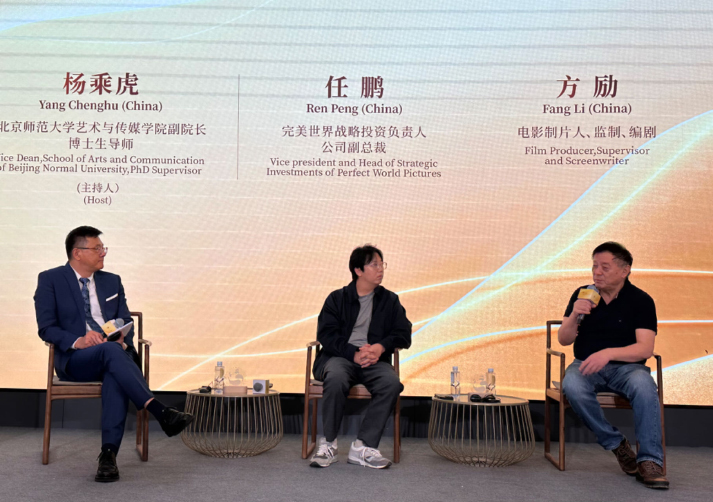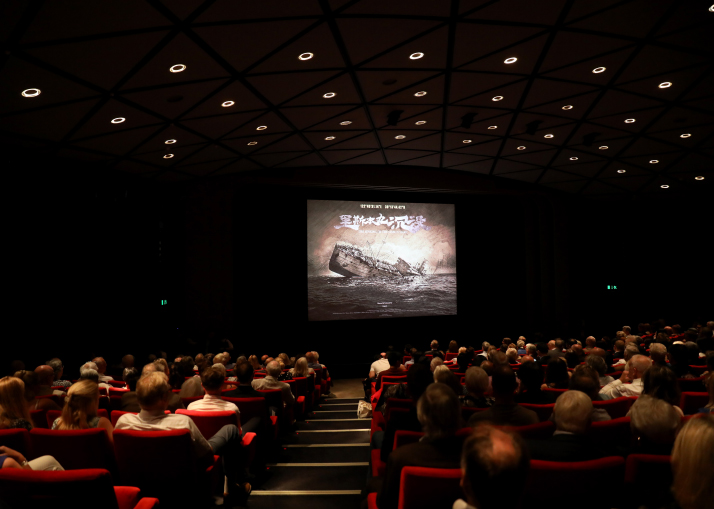| China |
| Screen media acting as a bond in cultural communication | |
|
|
 Film producer Fang Li (right) speaks at a salon during the Beijing Cultural Forum on September 20 (YUAN YUAN)
Director Bai Tao labeled the production of the TV series Happiness Juncao as the pinnacle of his illustrious career. The series narrates the stories of a Chinese team that disseminates Juncao technology, a pioneering agricultural technology, abroad. Juncao is a versatile hybrid grass that can be used to produce edible mushrooms, serve as nutritious livestock feed, or act as an ecological barrier to combat desertification. Bai said that the core members of the production team initiated interviews and research for producing the TV series in early 2022, and filming commenced in June 2023. "The production spanned four months and was set across multiple locations, including Fujian Province in southeast China, Papua New Guinea and Fiji," he said at a salon during the Beijing Culture Forum on September 20. The salon, co-organized by the Beijing-based Academy of Contemporary China and World Studies and the Golden Panda Award Executive Committee Office from Sichuan Province in southwest China, centered on the theme of promoting cultural exchange through film and TV dramas. A long march Happiness Juncao unfolds around the real-life endeavors of Chinese scientist Lin Zhanxi, who, in the 1980s, developed the groundbreaking Juncao technology, which allows farmers to grow mushrooms from dried Juncao grass, offering an eco-friendly alternative to traditional timber-based fungi-cultivation methods. More than two decades ago, China initiated the Juncao project, an international aid project, in Papua New Guinea in 2001. Since its debut, the technology has successfully established itself in over 100 countries. The TV series Happiness Juncao not only chronicles the technical team's struggles with numerous cultural shocks but also addresses the challenges posed by diverse geological climates and inadequate local facilities, which have made the widespread adoption of the Juncao technology a complex and demanding task. The production team itself faced similar challenges in the development of the series, grappling with cultural differences and local logistical issues in the countries where they filmed. This parallel between the storyline and the production process gives the production team a deeper insight into the resilience and dedication required to bring such a transformative technology to the world stage, and adds depth to the series. Catalyst for cultural exchange "China's efforts in foreign aid provide a rich source of material for film and TV series makers and are an excellent way to enhance international exchange," Bai said. "Language barriers exist and national borders define countries, but emotions between people are universal. Regardless of skin color or language, as long as people connect heart to heart, they can ultimately come together." Welcome to Milele, a TV series released late last year, draws from the authentic real-life experiences of doctors from China's medical teams working in Africa. Since April 1963, when China sent its first medical team to aid Algeria, the country has dispatched over 30,000 medical professionals to 76 countries and regions around the globe. Welcome to Milele, a rarity as a large-scale internationally co-produced Chinese TV drama, was filmed across seven locations in China and Tanzania. Director Jin Ye said in an interview with newspaper Beijing Daily that it was the most challenging project he had ever worked on in his career. The production team faced difficulties such as differences in local customs and religious beliefs, and they coordinated with local police, officials and other parties to overcome these difficulties. The series narrates everyday stories with a light, humorous tone to bring them closer to the audience. "The co-production of films and TV series between China and foreign countries serves as a powerful catalyst for cultural exchange as films and TV dramas are a vivid medium through which to show the culture, history and lifestyle of different cultures," Wang Yan, Brand Content Director at National Geographic China, said at a salon held during the forum.  A special screening of the documentary The Sinking of Lisbon Maru takes place in London on August 17, 2023 (XINHUA)
Echoes of valor Some films produced in China have been well received overseas and served as bridges of cultural communication. A good number of TV series from China have been translated into multiple languages and broadcasted across numerous countries in recent years, Wang said at the salon. One such film was produced by Fang Li, a seasoned 70-year-old film producer, who attended the salon, and shared his captivating journey in creating a documentary, which recounts a remarkable tale of heroism during World War II (1939-45). The documentary, The Sinking of the Lisbon Maru, made its debut on the big screen in China on September 6. It transports viewers to 1942, when the Japanese military employed a cargo vessel, the Lisbon Maru, to transport over 1,800 British prisoners of war from Hong Kong to Japan. The ship did not follow the Geneva Convention by marking it as a vessel carrying prisoners of war (POWs). Tragically, it was torpedoed by a U.S. submarine in the waters off Dongji Island, located in Zhoushan, Zhejiang Province, China. As the vessel began to sink, the Japanese sealed the POWs inside, using wooden planks and canvas to nail the doors shut. Spotting the sinking ship, more than 200 courageous fishermen from Zhoushan in Zhejiang risked their lives to rescue 384 POWs, providing them shelter and shielding them from Japanese search efforts. Fang stumbled upon this untold story while working on another film on the island in 2014. Drawing upon his four decades of experience in exploration and marine surveying, as well as his nearly two decades in the film industry, he resolved to capture and preserve this extraordinary narrative. After obtaining sonar images of a sunken wreck, which was then confirmed to be the Lisbon Maru, he and his crew embarked on a journey to the United Kingdom, Hong Kong Special Administrative Region of China, and other locations to interview survivors and historians in 2018. "Initially, my intention was merely to record the history, but as more pieces of the puzzle were unveiled, and the stories became increasingly poignant, I realized the significance of bringing this tale to the big screen," he said at the salon. "Just as the fishermen saved over 300 lives in 1942, our film project serves as a means of preservation, saving history itself. Saving history of a grand event needs the collaboration of people from all over the world," Fang said. The entire process spanned approximately eight years. Since its release, the documentary has garnered applause from audiences at home and abroad for its deeply touching plot. (Print edition title: Waves of Visual Tales) Copyedited by G.P. Wilson Comments to yuanyuan@cicgamericas.com |
|
||||||||||||||||||||||||||||
|